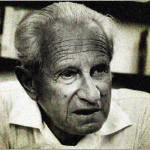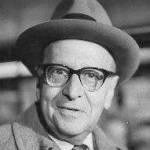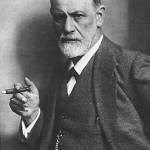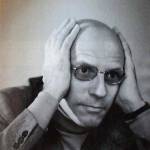[This excerpt is from Chapter 5 of Explaining Postmodernism: Skepticism and Socialism from Rousseau to Foucault]
 Marcuse and the Frankfurt School: Marx plus Freud, or oppression plus repression
Marcuse and the Frankfurt School: Marx plus Freud, or oppression plus repression
Marcuse had long labored in the trenches of academic philosophy and social theory before coming to fame in America in the 1960s. He studied philosophy at Freiburg under Husserl and Heidegger, later becoming an assistant to both. His first major publication was an attempt to synthesize Heideggerian phenomenology with Marxism.[25]
His powerful allegiance to Marxism combined with his Heideggerian distrust of Marxism’s rationalistic elements led Marcuse to join forces with the nascent Frankfurt School of social thought. The Frankfurt School was a loose association of mostly German intellectuals centered at the Institute for Social Research, led from 1930 on by Max Horkheimer.
Horkheimer had also been trained in philosophy, having completed his doctoral dissertation on the philosophy of Kant in 1923. From that work Horkheimer moved directly to concerns with social psychology and practical politics. In the late 1920s, while Marcuse was working on his theoretical integration of Marx and Heidegger, Horkheimer was reaching some pessimistic conclusions about the possibility of practical political change.
Setting before himself the question of why the German proletariat were not revolting, Horkheimer offered a breakdown of the politically relevant units, arguing that each was incapable of achieving anything significant.[26] Naturally enough, Horkheimer began his analysis with the working classes, dividing them into the employed and the unemployed. The employed, he noted, are not too badly off and seem content enough. It is the unemployed who are in the worst shape. Their situation is also getting worse, for as the mechanization of production increases, unemployment also increases. But the unemployed are also the least educated class and the least organized, and that has made it impossible to raise their class consciousness.  A clear sign of this is that they waver between voting for the Communists, who are blindly following Moscow, and the National Socialists who are, well, a bunch of Nazis. The only other socialist party is the Social Democrats, but they are much too pragmatic and reformist to be effective.
A clear sign of this is that they waver between voting for the Communists, who are blindly following Moscow, and the National Socialists who are, well, a bunch of Nazis. The only other socialist party is the Social Democrats, but they are much too pragmatic and reformist to be effective.
So, Horkheimer concluded, the situation is hopeless for socialism. The employed are too comfortable, the unemployed are too scatterbrained, the social democrats are too wishy-washy, the communists are too obediently following authority, and the National Socialists are un-discussable.
As way out of the morass, the Frankfurt School’s members began to explore the idea of adding a more sophisticated social psychology to Marxism’s economic and historical logic. Traditional Marxism emphasized the inexorable laws of economic development and de-emphasized the contribution of human actors. Given that those Marxist laws seemed rather more exorable in their non-development, the Frankfurt School suggested that history is as much made by human actors, and especially by how those human actors understand themselves psychologically and their existential situation. Incorporating a better social psychology into Marxism would hopefully explain why the revolution had not happened and suggest what would be necessary to make it happen.
For sophisticated social psychology the Frankfurt School turned to Sigmund Freud. Applying his own psychoanalytic theories to social philosophy, Freud’s Civilization and Its Discontents (1930) argued that civilization is an unstable, surface phenomenon based upon the repression of instinctual energies. Bio-psychologically, human agents are a bundle of aggressive and conflicted instincts, those instincts constantly pressing for immediate satisfaction. Their constant immediate satisfaction, though, would make social living impossible, so the forces of civilization have evolved by incrementally suppressing instincts and forcing their expression into polite, orderly, and rational forms. Civilization is thus an artificial construct overlaying a seething mass of irrational energies in the id. The battle between the id and civilization is ongoing and occasionally brutal. To the extent that the id wins, society tends toward conflict and chaos; and to the extent that society wins, the id is forced into repression. Repression, however, merely forces the id’s energies underground psychologically, where those energies are unconsciously displaced and often forced into irrational channels. That displaced energy, Freud explained, must discharge itself eventually, and often it does so by bursting out neurotically—in the form of hysterias, obsessions, and phobias.[27]
The task of the psychoanalyst, then, is to trace the neurosis back through its irrational, unconscious channels to its origin. Patients, however, often interfere with this process: they resist the exposure of unconscious and irrational elements in their psyches and they cling to the conscious forms of civilized and rational behavior that they have learned.  So the psychoanalyst must find a way to bypass those surface, blocking behaviors, and to strip away the conscious veneer of civility to probe the seething id below. Here, Freud suggested, the use of non-rational psychological mechanisms becomes essential—dreams, hypnosis, free-association, slips of the tongue. Such manifestations of irrationality are often clues to the underlying reality, for they slip past the patient’s conscious defense mechanisms. The well-trained psychoanalyst, accordingly, is the one who is able to spot the truth in the irrational.
So the psychoanalyst must find a way to bypass those surface, blocking behaviors, and to strip away the conscious veneer of civility to probe the seething id below. Here, Freud suggested, the use of non-rational psychological mechanisms becomes essential—dreams, hypnosis, free-association, slips of the tongue. Such manifestations of irrationality are often clues to the underlying reality, for they slip past the patient’s conscious defense mechanisms. The well-trained psychoanalyst, accordingly, is the one who is able to spot the truth in the irrational.
To the Frankfurt School, Freud offered a psychology admirably suited to diagnosing the pathologies of capitalism. Capitalism, we know from Marx, is definitely based on exploitative competition. But modern capitalist society is taking a technocratic form, directing its conflictual energies toward creating machines and corporate bureaucracies. Those machines and bureaucracies do provide for the average member of the bourgeoisie an artificial world of order, control, and creature comforts—but at a very high cost: capitalism’s people are increasingly distant from nature, decreasingly spontaneous and creative, increasingly unaware that they are being controlled by the machines and the bureaucracies, both physically and psychologically, and increasingly unaware that the apparently comfortable world they live in is a mask for an underlying realm of brutal conflict and competition.[28]
The Frankfurt School portrait of capitalism, Marcuse explained, is what we find realized most extremely in the most advanced capitalist nation, the United States.
Consider Joe Sixpack. Joe works as a low-level technician for a television-manufacturing company, part of a huge telecommunications conglomerate. Whether he has a job tomorrow depends on Wall Street speculators and the decisions of a corporate head-quarters in another state. But Joe does not realize that: he simply goes to work each morning with a slight sense of distaste, pulls the levers and pushes the buttons as he is told to do by the machine and the boss, mass-producing televisions until it is time to go home. On the way home he picks up a six-pack of beer—another mass-market product of capitalist commodification—and after supper with the family he plops down in front of the television, feeling the narcotic effect of the beer kicking in while the sitcoms and commercials tell him that life is great and who could ask for anything more. Tomorrow is another day.
Joe Sixpack is a product. He is a constructed part of an oppressive and dysfunctional competitive system—but one that is overlain with the veneer of peace and comfort.[29] He is unaware of the gap between the appearance of comfort and the reality of oppression, unaware that he is a cog in an artificial technological system—unaware because the fruits of capitalism that he produces and thinks he enjoys consuming are sapping his vital instincts and making him physically and psychologically inert.
Thus Marcuse had an explanation for the new generation of revolutionaries-in-training for why capitalism in the 1950s and early 1960s seemed to be peaceful, tolerant, and progressive—when, as every good socialist knew, it could not really be—and for why the workers were so disappointingly un-revolutionary. Capitalism does not merely oppress the masses existentially, it also represses them psychologically.
It gets worse, for to the extent that Joe can even think about his situation, he hears his world described in terms of “freedom,” “democracy,” “progress”—words that have only a faint glimmer of meaning to him, and that have been crafted and fed to him by capitalism’s apologists to keep him from thinking too deeply about his real existence. Joe is a “one-dimensional man” trapped in a “totalitarian universe of technological rationality,”[30] oblivious to the second and real dimension of human existence wherein true freedom, democracy, and progress lie.[31]
Capitalism’s having achieved this cynical state of development, in which its oppression is masked by pious hypocrisies about liberty and progress, is made even more cynical by its being able to neutralize and even co-opt all dissent and criticism. Having created a monolithic technocracy—the machines and the bureaucracies and the mass man and the self-serving ideology—capitalism can pretend to be open to criticism by allowing some radical intellectuals to dissent. In the name of “tolerance,” “open-mindedness,” and “free speech,” a few lonely voices will be permitted to raise objections and challenges to the capitalist behemoth.[32] But everyone knows full well that nothing come of the criticisms. Worse still, the appearance of having been open and tolerant will serve only to reinforce capitalism’s control. Capitalist tolerance, then, is not real tolerance: it is “Repressive Tolerance.”[33]
So was Horkheimer’s early pessimism right? Was the lesson thirty years later still the same—that the prospect for socialism is totally hopeless? If capitalism’s control extends even to co-opting the dissent of its strongest critics, what weapons are left to the revolutionary?
If there is a chance for socialism, then more extreme tactics will be necessary.
Freudian psychology again gives us the key. As with the repression of the id’s energies by the forces of civilization, capitalism’s suppression of the original human energies cannot be totally successful. Freud had explained that the id’s repressed energies will occasionally burst out in irrational, neurotic forms, threatening the stability and security of civilization. The Frankfurt School taught us that capitalism’s orderly technocracy has repressed much of humanity, driving much of its energy underground—but that repressed energy is still there, and potentially it can burst out.
Thus, Marcuse concluded, capitalism’s repression of human nature may be socialism’s salvation. Capitalism’s rational technocracy suppresses human nature to the point that it bursts out in irrationalisms—in violence, criminality, racism, and all of society’s other pathologies. But by encouraging those irrationalisms the new revolutionaries can destroy the system. So the first task of the revolutionary is to seek out those individuals and energies on the margins of society: the outcast, the disorderly, and the forbidden—anyone and anything that capitalism’s power structure has not yet succeeded in commodifying and dominating totally. All such marginalized and outcast elements will be “irrational,” “immoral,” and even “criminal,” especially by capitalist definition, but that is precisely what the revolutionary needs. Any such outcast element could “break through the false consciousness [and] provide the Archimedean point for a larger emancipation.”[34]
Marcuse looked especially to the marginalized and outcast Left intellectual leadership—especially those trained in critical theory.[35] Given the pervasiveness of capitalism’s domination, the revolutionary vanguard can come only from those outcast intellectuals—especially among the younger students[36]—those who are able to “link liberation with the dissolution of ordinary and orderly perception”[37] and who thereby can see through the appearance of peace to the reality of oppression, who have retained enough of their humanity not to have been turned into Joe Sixpack—and above all who have the will and the energy to do anything it takes, even to the point of being “militantly intolerant and disobedient,”[38] to shock the capitalist power structure into revealing its true nature, thus toppling and smashing the system to pieces, leaving the way open for a renewal of humanity through socialism.
Marcuse’s reign as the pre-eminent philosopher of the New Left signaled a strong turn towards irrationality and violence among younger Leftists. “Marx, Marcuse, and Mao” became the new trinity and the slogan to rally under. As was proclaimed on a banner of students involved in closing the University of Rome: Marx is the prophet, Marcuse is his interpreter, and Mao is the sword.
Many in the new generation listened attentively and sharpened their swords.
References
[25] Marcuse 1928.
[26] Horkheimer 1927, 316-18.
[27] Freud 1930, esp. Ch. 3.
[28] Horkheimer and Adorno 1944, xiv-xv.
[29] Marcuse 1969, 13-15.
[30] Marcuse 1964, 123.
[31] Marcuse is thus halfway between Rousseau and Foucault. Rousseau (1749): “Princes always view with pleasure the spread among their subjects of a taste for the arts. … The sciences, letters and arts … cover with garlands of flowers the iron chains that bind them, stifle in them the feeling of that original liberty for which they seem to have been born, make them love their slavery, and turn them into what is called civilized people.” Foucault: “What is fascinating about prisons is that, for once, power doesn’t hide or mask itself; it reveals itself as tyranny pursued into the tiniest details; it is cynical and at the same time pure and entirely ‘justified,’ because its practice can be totally formulated within the framework of morality. Its brutal tyranny consequently appears as the serene domination of Good over Evil, or order over disorder” (1977b, 210). Also: “If I had known the Frankfurt School at the right time, I would have been spared a lot of work” (Foucault 1989, 353).
Foucault: “What is fascinating about prisons is that, for once, power doesn’t hide or mask itself; it reveals itself as tyranny pursued into the tiniest details; it is cynical and at the same time pure and entirely ‘justified,’ because its practice can be totally formulated within the framework of morality. Its brutal tyranny consequently appears as the serene domination of Good over Evil, or order over disorder” (1977b, 210). Also: “If I had known the Frankfurt School at the right time, I would have been spared a lot of work” (Foucault 1989, 353).
[32] Marcuse 1965, 94-96.
[33] The title of Marcuse’s influential 1965 essay.
[34] Marcuse 1965, 111.
[35] Marcuse 1969, 89.
[36] Marcuse 1969, ix-x, 59.
[37] Marcuse 1969, 37
[38] Marcuse 1965, 123.
[This is an excerpt from Stephen Hicks’s Explaining Postmodernism: Skepticism and Socialism from Rousseau to Foucault (Scholargy Publishing, 2004, 2011). The full book is available in hardcover or e-book at Amazon.com. See also the Explaining Postmodernism page.]